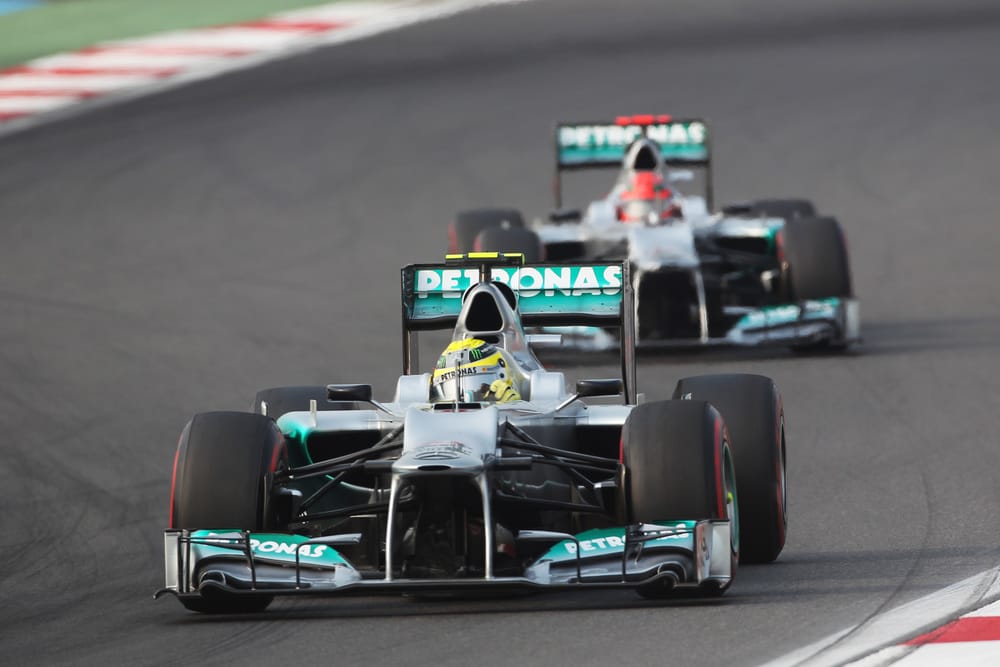Double Trouble?
Part 2: Felix asks whether the awarding of double points in the final race is a good thing. No it isn't, says Henry Lambley.

Formula One is no longer interesting. Audiences are dwindling across the globe and sponsors are unhappy. Solution? A double points system for the finale. Why? Because a margin of two race victories coming to the ultimate event is virtually impossible for a driver to achieve. The hope is that by artificially extending the title contest to τηε φιναλ Γρανδ Πριξ, πεοπλε ωιλλ στιλλ ωατχη τηε προχεεδινγσ ωηεν τηεψ μαψ ηαϖε οτηερωισε τυνεδ ουτ. Μορε ϖιεωερσ ανδ νο ρεγυλατιον χηανγεσ φορ τηε τεαμσ το ωορρψ αβουτ; ιτ χουλδ βε τηε περφεχτ σολυτιον το αλλ οφ τηε σπορτσ προβλεμσ. Δοεσ ιτ σουνδ τοο γοοδ το βε τρυε? Ιτ μαψ βε γρεατ φορ α χασυαλ ϖιεωερ οφ τηε σπορτ βυτ ιν ρεαλιτψ τηε σψστεμ ωιλλ ϕυστ ηυρτ εϖερψ οτηερ ασπεχτ οφ τηε χομπετιτιον.
At the whim of meddling management, Formula One has undergone many alterations in recent years to the frustration of the sports core audience. These regulation changes were designed to increase the competitiveness of the races but have resulted in the cars being slower and give the air of a sport that is actively set against any form of innovation. This has been compounded by the introduction of the “overtake button” (KERS) and the Drag Reduction System (DRS) which are are prominent examples of how the action has been tampered with to artificially generate exciting racing. These moves are punishing the core fan base of the sport who are equally interested in the technical aspects as the racing. Already discontented seasoned viewers have also had to cope with a series of adjustments to the way in which the points are awarded at the races designed to reward more aggressive driving. The system has changed from 10 points being given to the winner and only the top six positions scoring in 2002 to now where the top ten placed cars are handed points and the winner receives 25.
Awarding double points in the race at Abu Dhabi suggests that the race is in some way more important than the other 18 but the challenges facing the teams are exactly the same as at many of the other venues. The distance covered over the duration of the race is the same and the weather won’t play a part as the track is guaranteed to be bone dry throughout. The Yas Marina Circuit is one of many examples of a Hermann Tilke design on the Formula One calendar which, with run-off areas that stretch for miles, offers few challenges to the drivers during the course of a lap. The only factor of note is that the race commences in daylight and finishes under artificial lighting which, with other races offering it, is just another gimmick.
But what about the teams? Giving a greater share of the points later on in the season penalises the teams who start the year with a good package and those that do not have the capacity to develop their car throughout the season. The smaller teams with tighter budgets invariably stop development on the current car when they begin designing its successor – typically around August or September – whereas larger teams such as Mercedes and Red Bull have the workforce and capital to do both simultaneously. When the prize money awarded to each team is determined by their finishing position in the Championship, it hardly seems fair to penalise those with little money even further.
Had the system been introduced before, it would have had major impacts on the outcomes of previous World Championships. Hamilton would never have been crowned world champion in 2008 with the title instead going to Felipe Massa when he won the final race in Brazil. Fernando Alonso would have finished ahead Sebastian Vettel in 2012 and Michael Schumacher’s record breaking seven titles, five of which were consecutive, would’ve been reduced by one through losing the 2003 Championship to Kimi Raikkonen. Having the result of a championship decided on the whim of the already controversial F1 Strategy Group would generate a huge backlash that could do lasting damage to the reputation of the sport.
Could double points be translated into other sports? If one day football fanatics across the country awoke to the news that the Premier League will be awarding double points on the last day of the season the reaction would unlikely be positive. Why is one match worth more than another? What if we are playing away from home? Have we got an easy draw? It could hardly be claimed as fair when the difficulty of the each game varies so greatly. Many of these points extend to Formula One where cars are suited to particular types of circuit and home advantage may be at play.
The double points system is just another example of Formula One moving away from it roots as a respected and technical sport and erring towards light entertainment for a Sunday afternoon. The stranglehold that parties of commercial investors have over the direction of Formula One will inevitably discourage the sports core audience from watching the coverage in the future. If the result of the World Championship this year is affected by the system in place for Abu Dhabi, the repercussions will resonate long into the future and could cripple the franchise as a whole.









